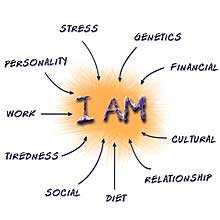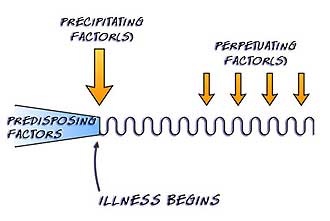 Why me?
Why me?
Why didn’t the illness begin two years ago when I was really stressed—life seems so good at the moment.
Are you saying I am to blame for my illness? He is angrier than I am and he isn’t sick!
Surely you don’t think cancer can be caused by feelings?
What about children born with defects?
Some people with very intense feelings get mild illnesses and others with more subtle issues get major illnesses—it doesn’t equate!
These are fascinating and difficult questions and issues. Would you like to explore some possible answers? You might like to print out this page and ponder the matters at leisure.

First and foremost, let’s remember that multiple factors play a role in just about everything that happens.
If you think hard enough about that you might just conclude that this is the answer to all these hard questions!
Remember too that the one factor that we are addressing here is the role of personal story or meanings in triggering and keeping your illness going.
Other factors may be so important that addressing your story will not make a difference, or, or on the other hand story may be so important that you are noticing a difference already while you work through Illness Explorer.
Keeping this principle of multiple factors in mind we can make some educated attempts at outlining possible answers to your questions.

We see a 30 year old woman with an inflammatory bowel disease that comes on at 15 when a friend discards her, which gets worse when her partner of 5 years leaves her, and which fluctuates up and down around issues of isolation and intimacy occurring from day to day.
Someone else with rather similar issues and experiences presents with depression. Another with similar issues doesn’t appear to have any health manifestations until age 52, and then develops occupational overuse syndrome in stressful conditions at work.
Yet working with these people around these issues clears up their illnesses. All of them were ‘brewing’ their illnesses and emotional meanings in their own way.
One managed to put off ill health for longer. Of course each person is totally unique. Each person accumulates his/her own burdens and pressures. Each will have a different capacity to withstand the “loading” caused by these.
That capacity may relate to such things as how warmly each was nurtured as an infant, what sort of personality style each was born with, the severity of the life strains each has come up against, the level of social support each has, and many many more factors or variables.

Why didn’t it all begin two years ago when I was really stressed?
All sorts of things come in here. It is common for us to see illness emerging after the storm is over.
Sometimes it seems as if the person holds themselves together through a crisis and then when the crisis is over they ‘let go’ and get ill. This is not a conscious thing.
Sometimes we see the pressures have accumulated over many years. The person has had many important events and stressful periods and is still holding him/herself together, and then something little is the final straw. Just a little more pressure and the system gives way.
Often when people are in a ‘good’ period it turns out that the external stresses are low, and the all important feelings are buried out of sight, and yet they are physically unwell.
These patients often find it hard to explore the story factors but if they can it is often very rewarding.

Sometimes, yes. Often , no!
Illness Explorer is offered because we have found that many patients do well when they make fairly simple discoveries about the connection between their physical manifestations and their story.
But I can think of someone with a relatively minor illness (a skin condition) and yet the issues underneath took 3 years to work through.
On the other hand the woman with the serious precancerous condition of the mouth took 7 sessions.
Sometimes we see people with multiple and serious physical problems combined with quite severe personality problems. For them the journey to healing can be very long indeed. If you are interested in the processes these people go through you might like to read my book. But I and my colleagues are now fairly cautious about predicting who is likely to move fast and who will move slowly.

The word BLAME has no part in my work.
When you think of all the possible factors which may play a role in the emergence of an illness then a simple apportioning of blame is a nonsense.
From a ‘story’ perspective one thing we can do though is to try and resolve our feelings and the way we think. No one can do this for us. Like it or not life is like that. So if these are playing some role in our illness then sorting them through is our opportunity and our responsibility.
All this gets really heavy when one considers cancer. Remember the woman with the precancerous condition of the mouth? But there are no easy answers here, and there is much more to understand. It may well be that some situations are too complex, too hard, too buried, too intense, too loaded, and too many people are involved, for anything to be sorted out to a level where healing could occur.
But we have been surprised how many times things start to heal when we don’t immediately assume it is too hard, and we (the patient and ourselves) ‘follow our noses’, and work through piece after piece gently and patiently.

Firstly, I am sure that children express distress in their bodies in the form of illness, and I believe that that can have it’s beginnings in the uterine experience.
Certainly we see children showing illness in response to family stress again and again. Shifting house, absence of parents, a depressed mother, arrival of a new sibling and the list goes on. We like to think that our children are not as burdened as we are!
In many cases that is true, but in other cases children are being exposed to things which they have little capacity to cope with. In addition they have less options in terms of speaking out a problem. Feelings may be quite overwhelming. The body may be the only available place for expression of an unresolvable dilemma.
Keep in mind too that multiple factors play a role. In terms of responsibility we, as adults, must ensure the foetus and the infant emerge in the safest and most caring supportive and loving environment if we want to facilitate good health. And yet finally when those infants become adults their history is a fact, and they have to confront their own story whatever it has been, and they have to take responsibility for how they will be in relation to that story from now on.
That can be very hard in the worst situations, and we often need much warm support as we endeavor to resolve our stories.